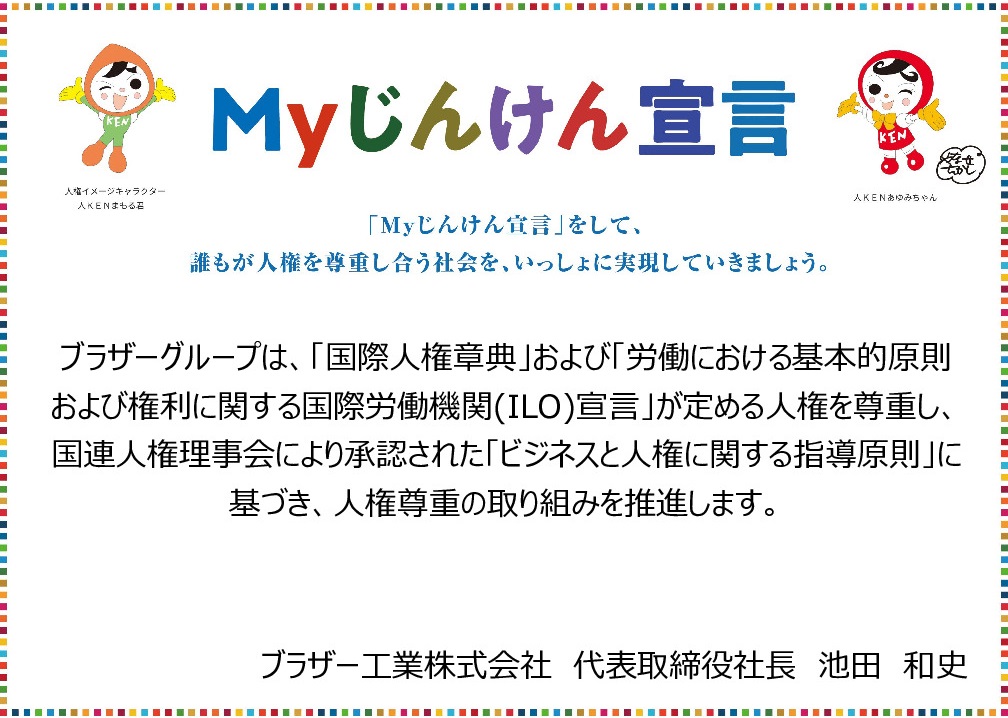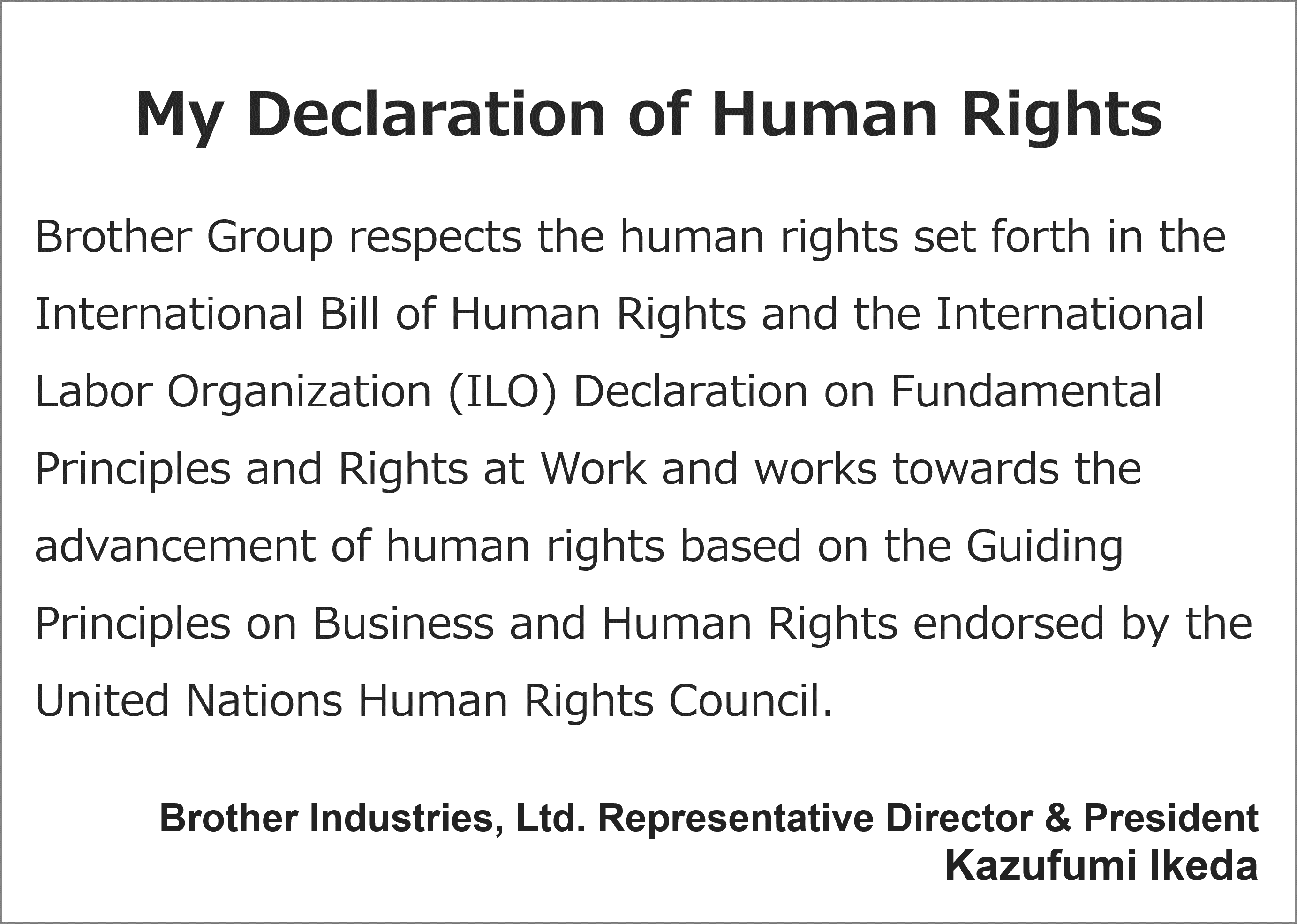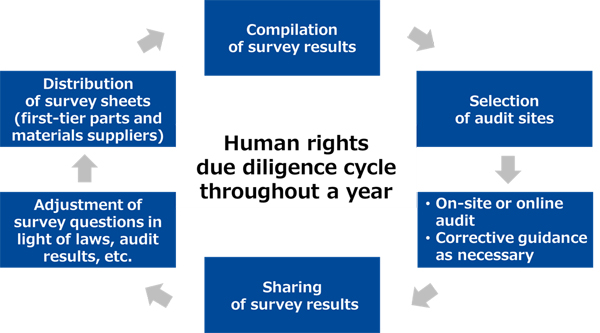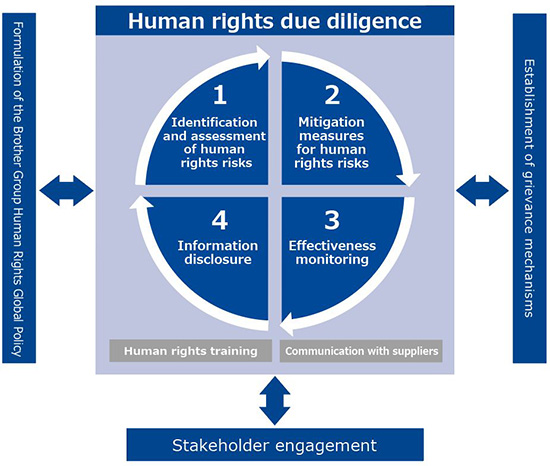Basic Policy (Brother Group Principles of Social Responsibility)
In 2012, the Brother Group Principles of Social Responsibility was formulated to clearly define our corporate responsibility and actions toward achieving a sustainable society.
Sections on, for example, respect for human rights, human rights due diligence, and grievance mechanism were established in this set of principles, which expresses the fundamental principles of the responsibilities and actions of companies in the Brother Group. It clearly states that we will provide fair working conditions, handle everyone with faith and respect, and observe fundamental human rights, and we expect our employees to act in the same way.
Overview of the Brother Group's commitment for respecting human rights
Brother Group Human Rights Global Policy
Brother Group respects the human rights of all people involved in the business activities of Brother Group, and actively engages in measures to ensure that our business activities do not have a negative impact on human rights.
In order to further work towards the advancement of human rights, we hereby formulate the Brother Group Human Rights Global Policy ("Policy").
1-Scope of application
This Policy applies to all officers, employees, part-time employees, expatriate employees, temporary employees, and contract workers of Brother Group. In order to ensure that the measures described in this Policy extends to the whole of the value chain, Brother Group shall, either directly or indirectly, request that the people who are involved in our group's products and services would understand the Policy and cooperate with surveys, audits, and other measures outlined in the Policy.
2-Respecting human rights
Brother Group respects the human rights set forth in the International Bill of Human Rights and the International Labor Organization (ILO) Declaration on Fundamental Principles and Rights at Work and works towards the advancement of human rights based on the Guiding Principles on Business and Human Rights endorsed by the United Nations Human Rights Council.
In case there is a difference between the internationally recognized standards on human rights and the laws and regulations of each country or region, Brother Group will adopt the higher standard of the two, and in case there is a conflict between those standards, Brother Group will follow the laws and regulations of each country or region, while pursuing ways to respect the internationally recognized human rights to the greatest extent possible.
*Human rights issues that are most important to Brother Group include the following:
- Non-discrimination and Non-harassment
- Fair and lawful labor practices
- Freedom of association
- Child and forced labor
- Health and safety at work
- Sanitation, food and housing
3-Human rights due diligence
Brother Group is aware of the effects that its business activities may have on human rights. For this reason, Brother Group has introduced, and will continue to implement a due diligence process to assess the negative impacts that its business activities may have on human rights.
In case where negative impacts on human rights are identified, Brother Group will suspend the business activities and transactions, strive to mitigate the negative impacts resulting from such activities, or implement other measures to correct or prevent recurrence of such negative impacts. Such measures will be monitored to ensure that they are implemented properly.
4-Relief mechanism
Brother Group will provide a helpline where people such as victims who are negatively affected by human rights within Brother Group's value chain can seek relief. The helpline is open to everyone, including those within and outside of Brother Group. At the helpline, Brother Group will maintain anonymity and confidentiality in order to protect those who raise their concerns.
5-Information disclosure / Consultation
Brother Group makes appropriate disclosures on its website and reports regarding its human rights due diligence policy and the measures taken to identify and remedy negative human rights impacts.
Brother Group will also engage in sincere consultation with relevant stakeholders regarding the impacts its business may have on human rights.
6-Trainings
Based on the Policy, Brother Group implements various training programs to prevent negative impacts on human rights.
Promotion Structure
The Brother Group has established the Sustainability Committee chaired by the Representative Director & President. The Responsible Value Chain Subcommittee is one of the subcommittees under this Committee and promotes Group-wide global efforts to ensure respect for human rights.
The Subcommittee formulates global human rights due diligence policies and implements human rights due diligence throughout the value chain as its activities to ensure that the human rights of people involved in the Group's business are respected and to provide safe and secure workplaces for workers.
For details, please see "Management with an Emphasis on Sustainability -Promotion of Management with an Emphasis on Sustainability- Promotion Structure".
Endorsing the "My Declaration of Human Rights" Promoted by the Ministry of Justice
BIL has endorsed the "My Declaration of Human Rights," an initiative advocated by the Ministry of Justice, and has issued its own declaration as the Brother Group.
The My Declaration of Human Rights is a program promoted by the Ministry of Justice and the National Federation of Associations of Human Rights Volunteers, encouraging companies, organizations, and individuals to declare their commitment to respecting human rights. By doing so, the initiative aims to create a society where everyone respects one another's human rights.
For more details, please visit the following website featuring the Brother Group's My Declaration of Human Rights.


Human Rights Due Diligence
At Brother Group, we request first-tier suppliers*1 of our main business divisions to implement measures for human rights. Furthermore, we aim for responsible procurement in our supply chain by requesting our first-tier suppliers to implement the same measures for their upstream suppliers.

Specifically, we conduct an annual questionnaire survey of our first-tier suppliers of our main business divisions on forced labor and child labor.*2 In addition to confirming whether or not there is any forced labor or child labor, this questionnaire survey also includes questions on whether they have in place human rights policies, clauses on prohibition of forced labor and child labor in major contracts with their business partners, and measures to confirm legal compliance among their business partners.
This questionnaire survey, which has been conducted since FY2021, indicates that none of our first-tier suppliers have been using forced labor or child labor over the four years up to FY2024.
Based on the survey results, we make written requests for improvements. We also conduct not only online but also onsite audits of our first-tier suppliers, selected based on the volume of transactions and other relevant factors. In FY2024, we conducted onsite audits to check the working environment, safety, and health. These audits further clarified the activities of suppliers who are making progress in their initiatives and also allowed us to deepen our understanding of the initiatives of each company.
| Item | Result | |||
|---|---|---|---|---|
| FY2021 | FY2022 | FY2023 | FY2024 | |
| Assessment based on survey | 951 companies | 1,128 companies | 1,129 companies | 1,196 companies |
| On-site or online audit | 10 companies | 10 companies | 10 companies | 25 companies |
| Number of companies subject to correction after audit | 1 company*4 | 2 companies | 0 company | 1 company*5 |
The Brother Group will continue to identify human rights risks in the value chain and to promote human rights measures for customers and upstream suppliers based on those risks.
- Suppliers mean companies that supply parts that are necessary for manufacturing Brother products.
- Once every two years for Domino Group*3. For details, please see "Respect for Human Rights by Suppliers".
- Domino Group means Domino Printing Sciences and its group companies that operate the Domino business.
- This entity was a first-tier supplier for TAIWAN BROTHER INDUSTRIES, LTD. Correction has been confirmed.
- This entity was a first-tier supplier for BROTHER MACHINERY XIAN CO., LTD. Corrective action in progress.
Grievance Mechanism
For all stakeholders: Establishment of a complaint reporting helpline
The Brother Group joined the Japan Center for Engagement and Remedy on Business and Human Rights (JaCER) in FY2022 and established a helpline (the link to the JaCER's website) where Brother Group suppliers, customers, investors, and all other stakeholders can raise specific concerns about human rights. This helpline allows anonymous reporting so that whistleblowers can report without fear of retaliation. When a report is received, we promptly investigate the case. In case negative impacts on human rights or human right risks are identified, we take necessary corrective action. No grievances were reported from FY2022 to FY2023.
For Officers and employees: Establishment of consultation and whistleblowing helpline (Employee Helpline for Compliance Issues)
At the Brother Group, Brother Industries, Ltd. (BIL) and group companies within and outside Japan have compliance consultation and whistleblowing helplines to prevent violations, act quickly against them, and take preventive steps against reoccurrences.
BIL has the internal Employee Helpline for Compliance Issues for employees to consult and report when they discover or suspect compliance violations, have issues which are not resolved even after reporting to and consulting with their workplace supervisors, or when they have issues which cannot be reported to or consulted with workplace supervisors due to inevitable circumstances. BIL has also established the internal Employee Helpline for Harassment Issues that is dedicated to harassment behavior—such as sexual and power harassment—in an effort to create workplace environments where employees can work while respecting each other. A Quality Compliance Helpline is also in place to prevent compliance and other violations related to the quality of products and services of the Brother Group and to respond to and correct any violations. In addition, an external helpline for compliance issues has also been established with affiliated lawyers outside the company to allow employees to directly report violations.
For details of the consultation and whistleblowing helpline, such as number of cases handled, please see the site for "Governance (G)- Compliance and Anti-Corruption- Brother Group Global Policy for Helpline for Compliance Issues".
Conduct of Training Related to Human Rights
The Brother Group conducts training related to human rights to prevent any negative impacts on human rights.
Human rights training for employees
BIL has been conducting an e-learning program on harassment for all employees since FY2021.
| Training period | March 2025 |
| Target | All employees of BIL (including employees temporarily transferred overseas and in Japan, and temporary employees) |
| Number of participants | 4,236 |
| Percentage of people trained | 90% |
| Topics | Explanation of the following items to prevent harassment:
|
In addition, we conduct training related to human rights, such as workshops on harassment, for management and managers (employees in senior positions) and training on Understanding Basic Human Rights related to basic knowledge about human rights for new employees.
Furthermore, in FY2024, we further strengthened our awareness-raising activities regarding harassment, with the aim of nipping small instances of harassment in the bud at an early stage and creating a workplace environment where it is easier to seek advice. Specifically, in addition to the annual e-learning program, we distributed books on harassment prevention to managers and also put up harassment prevention posters in the workplace. Additionally, we expanded harassment prevention training, which had previously been conducted only for newly appointed managers, to include general employees as well, holding it as a harassment prevention lecture by an external lecturer. A total of 341 people participated in the lecture, learning about what each of us can do to prevent harassment and what kind of behavior constitutes harassment.
For details, please see the site for "Social(S)- Talent Development- Details of Education System and Training".
Human rights training for suppliers
In FY2024, the Brother Group conducted human rights training for procurement personnel and factory management personnel of all first-tier suppliers of its main business divisions, with the aim of promoting understanding of "business and human rights"* among first-tier suppliers in Japan and overseas.
Participants asked for advice on how to inform second-tier suppliers about measures to be taken in light of "business and human rights" and made a request to confirm whether the measures they were implementing were appropriate. The training provided an opportunity for the participants to further deepen their understanding of "business and human rights."
| Training period | October 2024–February 2025 |
| Target | Procurement personnel and factory management personnel of all first-tier suppliers of our main business divisions |
| Format | E-learning (For participants who did not have access to a computer, the relevant data was sent by email.) |
| Number of participating companies | 856 companies |
| Attendance rate | 89% |
| Topics | Measures to be taken in light of "business and human rights"
|
- Considering the impact of corporate activities on human rights and protecting and respecting human rights
Respect for Human Rights for Suppliers
Brother Group's measures ("Procurement Policy" and "CSR Procurement Standards")
The Brother Group makes its "Procurement Policy" and "CSR Procurement Standards" publicly available to share its CSR procurement concept with parts and materials suppliers.
The policy and standards cover a wide range of fields, including human rights and labor, the rights to organize and bargain collectively, safety and health, global environmental protection, fair trade and ethics, product quality and safety, raw materials, information security, and social contribution. The Brother Group complies with local laws and regulations and supports workers' collective bargaining rights by conducting collective negotiations and respecting communication between management and employees on working conditions and management practices.
In the Procurement Policy, the Brother Group clearly states that we act fairly with all suppliers and take proactive approaches toward responsible procurement of minerals. In the CSR Procurement Standards, in addition to promoting understanding of the Brother Group Global Policy on Human Rights, we express our stance of respecting human rights in each stated item while requesting suppliers to cooperate in efforts to respect human rights in their procurement activities, as well as to establish a process to check the status of those efforts.
For details, please see the site for "Social(S)- Responsible Supply Chain".
Domino Group's Measures (Domino Supplier Code)
Domino Group establishes the "Domino Supplier Code"* which sets out expectations for its suppliers. The Domino Supplier Code stipulates human rights related matters such as prohibiting the use of child labor and forced labor, and is incorporated into contracts with its first-tier suppliers that are entered into upon commencing transactions. Furthermore, in order to confirm their ongoing compliance with the Code, Domino Group conducts a written survey for its first-tier suppliers once every two years.
- A policy setting out Domino Group's expectations for its suppliers. It covers the 4 key principles of treating people fairly, providing a safe and healthy workplace, protecting the environment, and behaving ethically, and is aligned with leading international global initiatives such as the United Nations Global Compact, International Labour Organisation (ILO) Conventions and Ethical Trading Initiative (ETI) Base Code.


